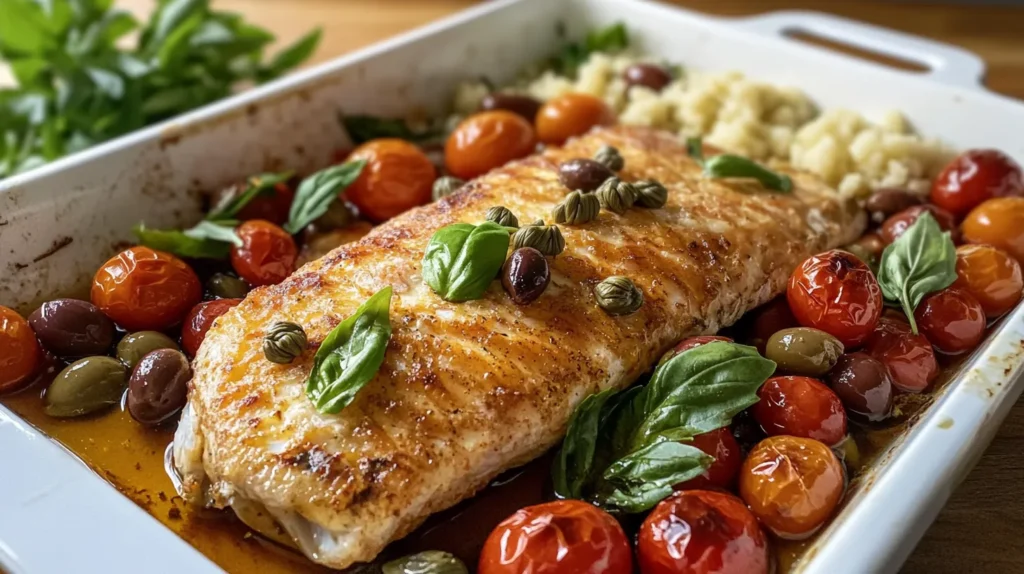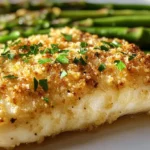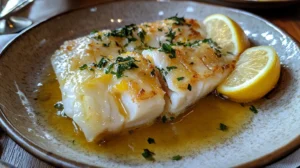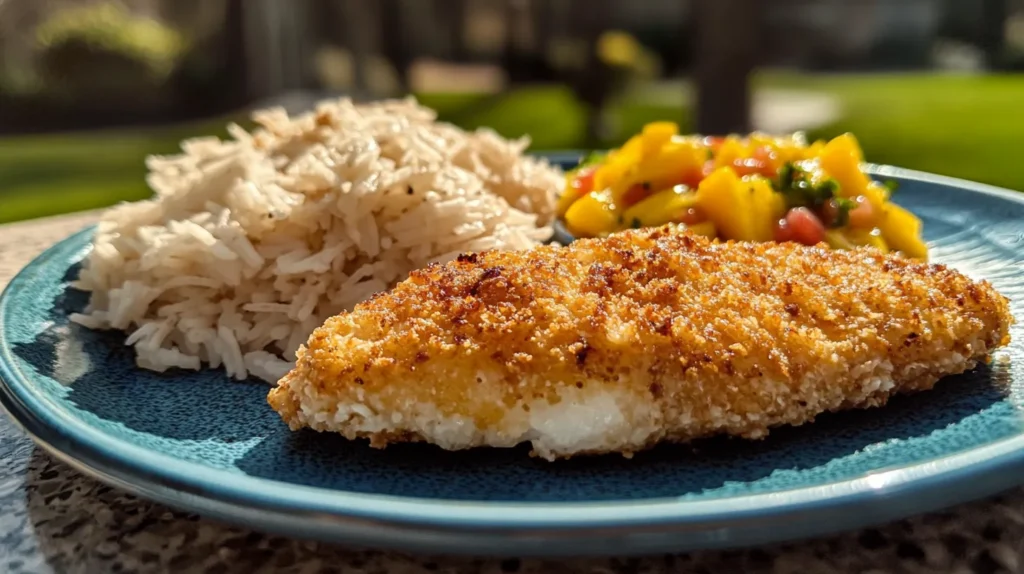Table of Contents
Gourmet Orange Roughy is a delicacy prized for its mild flavor and firm yet flaky texture, making it a top choice for seafood lovers. This deep-sea fish, often found in the cold waters of the Pacific and Atlantic Oceans, is known for its versatility in gourmet cooking. Whether pan-seared, baked, or grilled, Gourmet Orange Roughy absorbs flavors beautifully, making it an excellent canvas for various culinary creations.
Unlike some stronger-tasting fish, Gourmet Orange Roughy is ideal for those who prefer a milder seafood experience. Its subtle sweetness pairs exceptionally well with citrus-based sauces, fresh herbs, and buttery accompaniments, elevating it to gourmet status in fine dining. Many chefs appreciate its ability to hold up to different cooking techniques while remaining tender and moist.
From an expert culinary standpoint, preparing Gourmet Orange Roughy with the right combination of flavors and techniques enhances its natural richness. Whether you’re planning a sophisticated dinner or a light, elegant seafood dish, a well-prepared Gourmet Orange Roughy recipe is sure to impress. This guide will walk you through the best ways to prepare it, expert cooking tips, health benefits, and delicious variations.
What is Orange Roughy?
Orange roughy (Hoplostethus atlanticus) is a deep-sea fish known for its mild flavor, firm texture, and bright reddish-orange skin. Native to the deep waters of the Atlantic and Pacific Oceans, this fish thrives at depths of 500 to 1,500 meters (1,640 to 4,920 feet), where it develops its distinct qualities over a long lifespan—some individuals live over 100 years.
Appearance and Texture
- The flesh of orange roughy is white, lean, and has a slightly firm but flaky consistency when cooked.
- Unlike oilier fish like salmon or mackerel, orange roughy has a delicate, buttery taste that pairs well with both subtle and bold seasonings.
Why is Orange Roughy Considered Gourmet?
Orange roughy is highly valued in fine dining for its versatility and ability to absorb marinades and seasonings. Its naturally mild flavor allows chefs to craft refined dishes with citrus glazes, herb-infused butter, and delicate white wine reductions.
Sustainability Concerns
While orange roughy is delicious, it has been overfished in some regions due to its slow growth and late maturity. To enjoy this fish responsibly:
- Opt for sustainably sourced orange roughy from certified fisheries.
- Consider substitutes like haddock, cod, or tilapia for an environmentally friendly alternative.
Health Benefits of Orange Roughy
Orange roughy is not only a gourmet delicacy but also offers several nutritional benefits, making it a healthy addition to your diet. As a lean white fish, it provides essential proteins and nutrients while being low in calories and fat. Here’s a closer look at its health advantages:
1. High-Quality Protein Source
- Orange roughy is an excellent source of lean protein, essential for muscle growth, repair, and overall bodily functions.
- A single 3.5-ounce (100g) serving provides approximately 17-20 grams of protein, making it a great choice for those looking to boost their protein intake without excess fat.
2. Low in Fat and Calories
- Unlike fattier fish like salmon, orange roughy contains only 1 gram of fat per serving, making it an ideal option for low-fat diets.
- With around 90-100 calories per 3.5-ounce serving, it is a great protein choice for weight management.
3. Rich in Essential Minerals
- Selenium: Supports immune function and has antioxidant properties that protect against cellular damage.
- Phosphorus: Crucial for bone health, metabolism, and energy production.
- Potassium: Helps regulate blood pressure and supports heart and muscle function.
4. Low in Mercury (Compared to Some Other Fish)
While orange roughy does contain some mercury, it is generally lower than high-mercury fish like swordfish or shark. However, it should still be eaten in moderation, especially for pregnant women and young children.
5. Heart-Healthy Benefits
- Orange roughy contains omega-3 fatty acids, albeit in lower amounts than salmon or tuna. Omega-3s support heart health by reducing inflammation and promoting healthy cholesterol levels.
- The fish’s low saturated fat content makes it a heart-smart protein choice.
Is Orange Roughy Safe to Eat Regularly?
Due to its slow growth rate and longer lifespan, orange roughy can accumulate moderate levels of mercury over time. For this reason, it is recommended to limit consumption to once or twice a month, especially for those sensitive to mercury intake.

Expert Tips for Cooking Orange Roughy
To bring out the best flavors and textures in orange roughy, it’s essential to use the right cooking techniques. Whether you’re baking, pan-searing, or grilling, these expert tips will help you achieve a gourmet-quality dish every time.
1. Choosing the Best Orange Roughy
- Fresh vs. Frozen: Fresh orange roughy should have a mild ocean smell, firm flesh, and a slightly translucent appearance. If purchasing frozen, ensure there is no excess ice or freezer burn.
- Sustainably Sourced Options: Look for certifications such as MSC (Marine Stewardship Council) to ensure ethical sourcing.
2. Best Cooking Methods
- Pan-Searing: A quick method that enhances the natural flavors and creates a crispy exterior. Use butter or olive oil and cook over medium-high heat for 2-3 minutes per side.
- Baking: Perfect for infusing flavors. Bake at 375°F (190°C) for 12-15 minutes until the fish is opaque and flakes easily.
- Grilling: To prevent sticking, lightly oil the grill and the fish. Wrap in foil with herbs and citrus for added moisture.
- Poaching: Gently simmer in broth or white wine for a soft, delicate texture.
3. Flavor Pairings and Marinades
Orange roughy has a mild taste, making it a perfect canvas for different flavor combinations:
- Citrus-Based Marinades: Lemon, lime, or orange zest enhances its delicate flavor.
- Herbs & Spices: Dill, parsley, thyme, and garlic work well.
- Butter & Wine Sauce: A white wine reduction with butter and capers creates a restaurant-quality dish.
- Asian-Inspired Glazes: Soy sauce, ginger, and sesame oil add a unique twist.
4. How to Keep It Moist & Tender
- Avoid overcooking; the fish should flake easily with a fork but still be moist.
- Cook at moderate temperatures to retain its delicate texture.
- Use a light butter or olive oil baste while cooking to prevent dryness.
5. Presentation for a Gourmet Dish
- Serve with a side of roasted vegetables, wild rice, or a fresh salad for a balanced plate.
- Garnish with microgreens, lemon slices, or a drizzle of herb-infused oil to enhance visual appeal.

Gourmet Orange Roughy Recipe
- Total Time: 30 minutes
- Yield: 4 people 1x
Description
This Gourmet Orange Roughy Recipe features tender fillets baked with butter, lemon, and fresh herbs for a flavorful seafood dish. The mild, flaky texture absorbs the rich citrus flavors perfectly. Easy to make, it’s a healthy and elegant meal option.
Ingredients
- 4 6 oz orange roughy fillets
- 4 tbsp unsalted butter melted
- 2 tbsp fresh lemon juice
- 1 tsp garlic powder
- 1 tsp paprika
- 1/2 tsp salt
- 1/2 tsp black pepper
- 1 tbsp fresh parsley chopped
- 1 tsp fresh thyme leaves
- Lemon wedges ( for serving)
Instructions
- Preheat the oven to 375°F 190°C Lightly grease a baking dish
- In a small bowl mix melted butter lemon juice garlic powder paprika salt and black pepper
- Place the orange roughy fillets in the baking dish and brush them generously with the butter mixture

- Sprinkle with fresh parsley and thyme
- Bake for 12-15 minutes or until the fish flakes easily with a fork

- Serve immediately with lemon wedges

Notes
📌 Storage: Store leftover orange roughy in an airtight container in the refrigerator for up to 3 days. For longer storage, freeze for up to 2 months, ensuring the fish is tightly wrapped to prevent freezer burn. Reheat in the oven at 300°F or on the stovetop over low heat to maintain its texture and flavor.
📌 Flavor Variations: Enhance the dish by adding a drizzle of white wine to the butter mixture for a more refined taste or a pinch of cayenne pepper for a mild heat kick. For a crispy texture, coat the fillets in a light panko-parmesan crust before baking. A dash of soy sauce and ginger can give the dish an Asian-inspired twist.
📌 Pairing Suggestions: Serve orange roughy with garlic butter rice, roasted asparagus, or a fresh citrus salad for a light and refreshing meal. For a heartier option, pair it with mashed potatoes, grilled vegetables, or a side of quinoa for added nutrients.
📌 Meal Prep & Leftovers: This dish is excellent for meal prep, as the flavors develop even more after a day in the fridge. Flake leftover fish into tacos, seafood pasta, or salads for a quick and delicious meal. You can also use it in a fish sandwich with tartar sauce and fresh greens for a tasty lunch.
- Prep Time: 10 minutes
- Cook Time: 15 minutes
- Category: Dinner
- Cuisine: American
Nutrition
- Calories: 280
Variations of Orange Roughy Dishes
Orange roughy’s mild flavor and firm texture make it incredibly versatile, allowing it to be prepared in various styles to suit different tastes. Whether you prefer a light, healthy meal or a rich, indulgent dish, here are some gourmet variations to try:
1. Mediterranean-Style Orange Roughy
- Cooking Method: Baked
- Flavors: Olive oil, cherry tomatoes, kalamata olives, capers, garlic, and fresh basil.
- Serving Suggestion: Pair with quinoa or couscous for a balanced Mediterranean dish.
2. Lemon Herb Butter Orange Roughy
- Cooking Method: Pan-seared or oven-baked
- Flavors: Garlic, fresh parsley, lemon zest, and melted butter.
- Serving Suggestion: Serve with roasted asparagus and mashed potatoes.
3. Asian-Glazed Orange Roughy
- Cooking Method: Pan-seared or grilled
- Flavors: Soy sauce, sesame oil, ginger, honey, and rice vinegar.
- Serving Suggestion: Serve with steamed jasmine rice and stir-fried bok choy.
4. Cajun-Spiced Blackened Orange Roughy
- Cooking Method: Pan-seared
- Flavors: Smoked paprika, cayenne, garlic powder, onion powder, and thyme.
- Serving Suggestion: Serve with coleslaw and cornbread for a Southern-inspired dish.
5. Parmesan-Crusted Orange Roughy
- Cooking Method: Baked
- Flavors: Parmesan cheese, breadcrumbs, garlic, and Italian seasoning.
- Serving Suggestion: Serve with a side of lemon-garlic pasta and sautéed spinach.
6. Coconut-Crusted Orange Roughy
- Cooking Method: Pan-fried
- Flavors: Shredded coconut, panko breadcrumbs, lime zest, and a touch of cayenne.
- Serving Suggestion: Serve with mango salsa and coconut rice for a tropical twist.

Each of these variations allows you to experiment with different flavors and textures, ensuring that your orange roughy meals never become repetitive.
Frequently Asked Questions (FAQs)
u003cstrongu003eWhat are the drawbacks of eating orange roughy?u003c/strongu003e
Orange roughy has moderate mercury levels due to its long lifespan, and overfishing has led to sustainability concerns.
u003cstrongu003eWhy can’t you buy orange roughy anymore?u003c/strongu003e
In some regions, orange roughy is harder to find because of strict fishing regulations and declining populations due to overfishing.
u003cstrongu003eWhat seasoning is good on orange roughy?u003c/strongu003e
Lemon, garlic, butter, dill, paprika, thyme, and black pepper enhance its mild flavor.
u003cstrongu003eWhy is orange roughy on the avoid list?u003c/strongu003e
It is on some seafood u0022avoidu0022 lists because of slow reproduction rates, overfishing, and environmental concerns related to deep-sea trawling.
Conclusion
Orange roughy is a gourmet seafood option prized for its mild flavor, firm texture, and versatility in cooking. Whether pan-seared, baked, or grilled, it serves as an excellent base for a variety of seasonings and marinades, allowing for endless culinary creativity.
While it offers numerous health benefits, including being a great source of lean protein and essential minerals, it should be consumed in moderation due to sustainability concerns and mercury content. Choosing sustainably sourced orange roughy ensures responsible seafood consumption while still enjoying its delicate taste.
By experimenting with different flavors, cooking techniques, and variations, you can elevate orange roughy to a fine dining experience at home. Whether you prefer a light Mediterranean-style dish, a rich butter-infused preparation, or a bold Cajun-spiced version, this fish adapts beautifully to various cuisines.
If you’re looking for a gourmet seafood dish that is both delicious and elegant, a well-prepared orange roughy recipe is sure to impress. Try out the recipe and explore different variations to find your perfect match.


